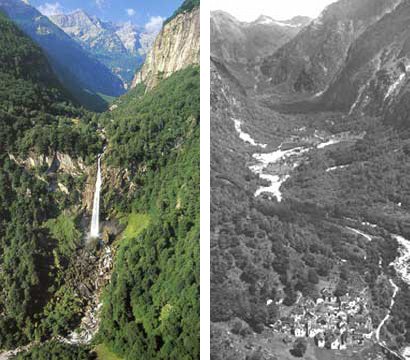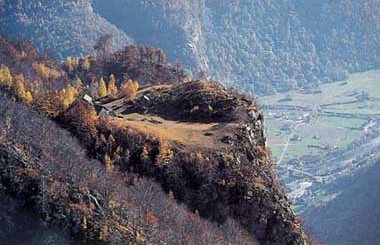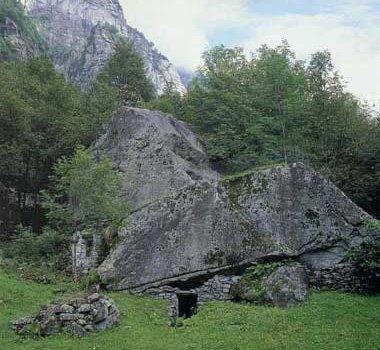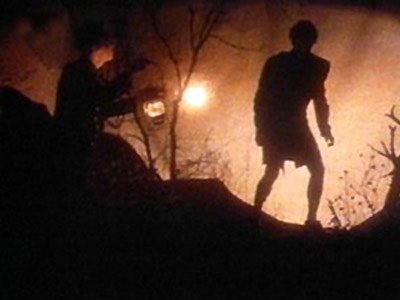
Val Bavona is a “short, rugged valley high in the mountains of Canton Ticino, Switzerland, an 'awesomely beautiful' place, gouged by the glacier, shaped by water and stone, in which a community (about a thousand people) has come to terms with the power and harshness of nature and over time has developed the ideas, the attitudes, the actions and the artefacts of human life when pushed to its limits.”
And furthermore, the community of Val Bavona “continues to celebrate the beauty of a lifestyle reduced to essentials (houses still do without electricity) as a real utopia, a simple, practical way of continuing, conserving and innovating the resolute search for living space that has characterized its history, finding a use even for the great rocks dislodged in landslides by using the earth they brought down with them to create fragments of vegetable garden and pasture or by the exploitation of jagged ravines to make grondàn, cantìn and splüi.”


And here I'm inexplicably forced to mention the movie Careful by Guy Maddin. Set in an Alpine village tucked inside a valley perhaps not unlike Val Bavona, everyone must speak in whispers and suppress all loud noises — the cries of a baby, the bleatings of goats, even coitus — lest they want to set off a deadly avalanche.
These forced propriety and decorum, however, lead to emotional repression. Here, landscape nurtures a lurid, baroque internal pathology which outwardly manifests itself into incestuous desires, suicide, self-mutilation and murder.
And some people say Sick Building Syndrome is bad?

I am hardly saying that incest occurs at all at Val Bavona, and would only be speculating if I were to suggest that it may have ran rampant in the past, caused by anxieties over jagged ravines or impending landslides and secretly carried out in any one of the many colloquial architecture.
I am, however, wondering if there are landscapes somewhere else that can induce such aberrant pathology, landscapes that are the antithesis of Healing Gardens.
Or how about landscapes that somehow have been transformed by pathology. Are prairie restorations, for instance, the result of a self-perpetuating quest for redemption? I'm sure that visiting a patch of prairie, reconstructed or otherwise, can result in a prolonged irrational dependence on Claritin.
(I'm forced again to mention another movie here — Safe by Todd Haynes.)
So if after visiting a site by Ken Smith or Martha Schwartz or Peter Walker and you started having migraines, nose bleeds, or seizures, let us know. And if any doctor consultation and expensive therapies failed to treat your symptoms, after which you joined a cult-like desert commune and now spend your nights holed up in a futuristic igloo isolation chamber, let us know about that, too. Or better yet, start a blog, and we'll link to each and every one of your posts.
Post a Comment —
Comments on posts older than a week are moderated —